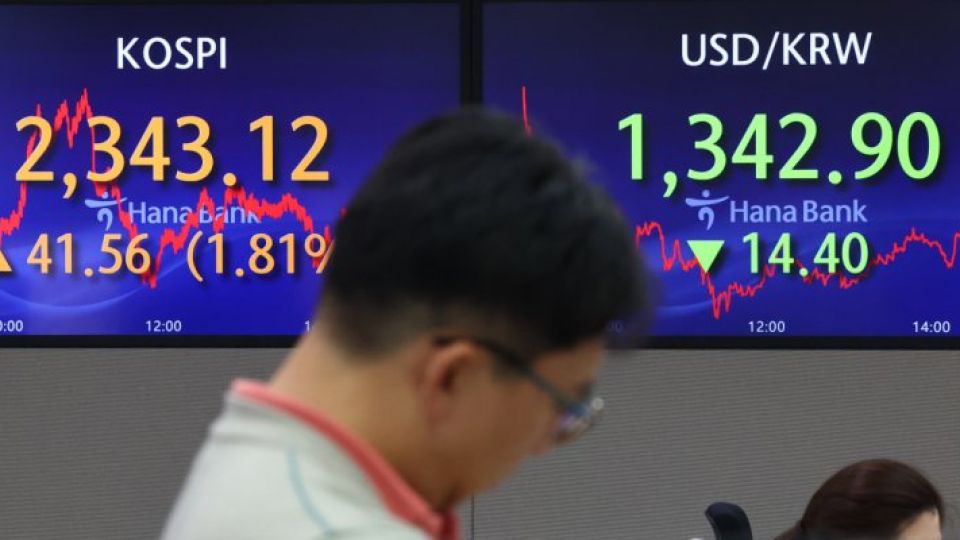November 3, 2023
SEOUL – The US Federal Reserve’s second consecutive decision to maintain its key rate has lifted some of the weight off the Bank of Korea, which has been in a standstill amid rising economic uncertainties.
The Federal Open Market Committee on Wednesday decided to hold the rate steady between 5.25 percent and 5.5 percent, continuing a rate freeze from September.
“With the FOMC’s decision meeting market expectations, the global financial market remained calm in the early morning,” Finance Minister Choo Kyung-ho said at a meeting Thursday.
The decision marks the first time the US Fed has held rates steady for two consecutive meetings since it began tightening monetary policy last year. The last rate hike was in July.
“But as the Fed Chair Jerome Powell mentioned at a press conference, global inflationary pressure is strong, and uncertainties exist due to geopolitical tensions,” Choo said.
Following the decision that hinted that US rates will be maintained at the current level for a while, the Korean won against the US dollar gained value, closing at 1,342.9 won Thursday, improving 14.4 won from the previous day. It significantly strengthened compared to standing at 1,360 won on Oct. 26.
With the Fed’s rate pause, the Korean central bank is likely to go for its seventh consecutive rate freeze at its last rate-setting meeting of the year slated to take place on Nov. 30.
Since February, the BOK has been holding its rate at 3.5 percent, while leaving room for further rate hikes with a hawkish stance. As the local monetary policy is heavily affected by that of the US, it will not be easy for the BOK to lift the rate alone as the US Fed maintains a standstill.
Yet, rising prices pressure the central bank. Disinflation, a decrease in the rate of inflation, has been slower than initially expected.
On Thursday, data from Statistics Korea showed consumer prices, a key inflation gauge, rose 3.8 percent last month on year. It is the third month in a row for the annual price growth to pick up pace, from 3.4 percent in August and 3.7 percent in September.
Though the BOK expects inflation to slow down within this year, price growth is yet far from the central bank’s goal set at 2 percent.
As the FOMC meeting showed it took the tightened financial conditions due to high rates into consideration, the market’s concern on further rate hikes has been eased, Lee Sang-hyeong, deputy governor at BOK, said Thursday at a separate meeting.
“Powell stressed the need to maintain a restrictive monetary policy to meet the inflation goal,” Lee said. “We will keep a close eye on how the inflation, economy of major nations, prolonged restrictive monetary policy and development of the Israel-Hamas conflict will impact the financial, foreign exchange market in and out of Korea.”
Another concern for the BOK is geopolitical tension in the Middle East sparked by the conflict between Israel and Hamas militants, especially as it impacts international oil prices.
“If the international oil prices surpass $90 (per barrel), our projection (on inflation and growth) may change extensively,” BOK Gov. Rhee Chang-yong said at a BOK seminar held with the Korea Chamber of Commerce and Industry on Wednesday.
The BOK had initially projected oil prices to be at around $84 in the first half of next year.
“The Fed’s rate pause does not mean the end of its restrictive monetary policy stance, though it is likely the rate freeze will continue for a while,” said Sung Tae-yoon, an economics professor at Yonsei University. “Along with the Fed, the BOK is likely to hold its rate in November, considering the economic uncertainties in and out of Korea.”
Backed by the dovish outlook on the US Fed’s rate stance, Seoul shares showed gains, partly recovering from losses seen earlier this week. The benchmark Kospi closed at 2,343.12 points, up 41.56 points from the previous day. The secondary bourse Kosdaq wrapped up at 772.84 points, gaining 33.61 points.


